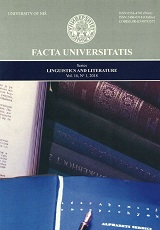INTERPRETING THE AT-ISSUE STATUS OF NON RESTRICTIVE RELATIVE CLAUSES IN A FOREIGN LANGUAGE: A CASE OF SERBIAN EFL STUDENTS
INTERPRETING THE AT-ISSUE STATUS OF NON RESTRICTIVE RELATIVE CLAUSES IN A FOREIGN LANGUAGE: A CASE OF SERBIAN EFL STUDENTS
Author(s): Ema ŽivkovićSubject(s): Foreign languages learning
Published by: Универзитет у Нишу
Keywords: (not-)at-issue status; non-restrictive relative clause; appositive relative clause; continuative relative clause; discourse relations; English as a foreign language
Summary/Abstract: Linguistic utterances can convey content which represents the speaker’s main point and is considered to be at-issue, as well as secondary content which is interpreted as not-at-issue. A large number of diverse expressions which carry some kind of not-at-issue content have been identified. The present paper contributes to the ongoing investigation of one group of such expressions, non-restrictive relative clauses (NRRCs), in English as a foreign language. The starting point of the paper is an approach developed by Jasinskaja (2016), which accounts for at-issue status within the general theory of discourse interpretation. An important prediction that it makes is that final NRRCs connected with their main clauses via coordinating discourse relations should express more at-issue behavior than final NRRCs connected with their main clauses via subordinating discourse relations. Relying on this approach, the present paper aims to investigate the way Serbian EFL students interpret the at-issue status of NRRCs and to compare the results to the existing data in English (Živković 2016). The direct rejection test (Tonhauser 2012) was used to diagnose the at-issue status of the test items, which involved the manipulation of coordinating and subordinating discourse relations between main clauses and NRRCs. The overall results indicated that the percentage of rejections targeting coordinate NRRCs was significantly higher than the percentage of subordinate NRRC rejections. Comparing these results to the ones obtained in English showed that Serbian EFL students performed at the same level as native speakers of English when interpreting the at-issue status of English NRRCs.
Journal: FACTA UNIVERSITATIS - Linguistics and Literature
- Issue Year: 16/2018
- Issue No: 1
- Page Range: 65-80
- Page Count: 16
- Language: English

